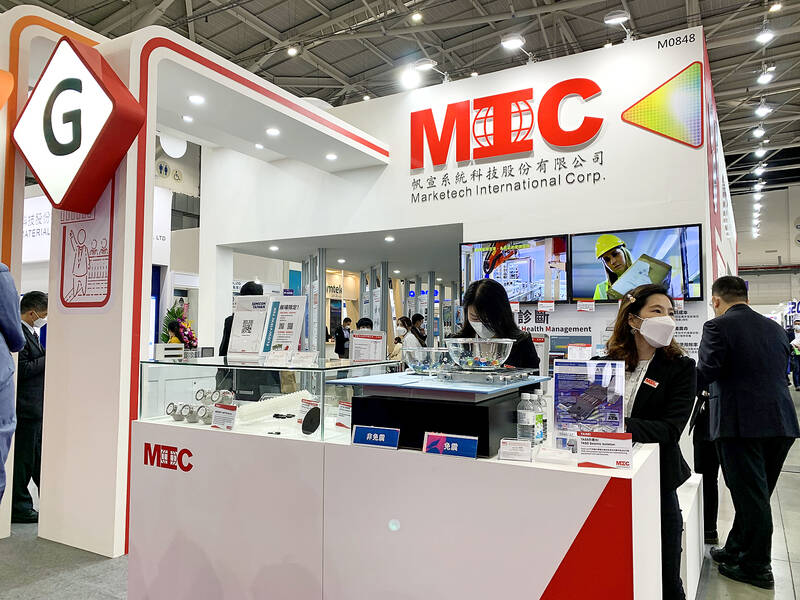Marketech International Corp (帆宣), a semiconductor and display panel equipment supplier and distributor, yesterday said it is to launch a subsidiary in Dresden, Germany, as its major customer, Taiwan Semiconductor Manufacturing Co (TSMC, 台積電) last month announced it is building its first European fab in the area.
TSMC is constructing a 12-inch wafer fab in Dresden to produce mainly car chips. The world’s largest contract chipmaker plans to build three advanced fabs in Arizona and two in Kumamoto, Japan.
Marketech has set up US and Japan subsidiaries to provide services to TSMC in those countries. It also set up an office in the Czech Republic last year to collect information about the local investment environment.

Photo: Grace Hung, Taipei Time
Marketech plans to hire about 125 employees in Europe — about half the size of its US subsidiary, company president Scott Lin (林育業) said yesterday.
The US subsidiary remains in the red due to higher labor costs, he said.
The company has slowed down the construction of a new factory in Tainan due to weaker-than-expected demand from display panel customers, he said.
Lin added that the company expects the NT$1.9 billion (US$59.2 million) Tainan factory would become operational in the second quarter of next year.
Marketech’s revenue in the first seven months of the year grew 10.42 percent annually to NT$34.92 billion.
The company expects revenue and net profit to show moderate growth in the second half of the year, Lin said.
However, the company projects more marked growth in revenue and profit next year, given an expected more solid recovery in the semiconductor industry and the contribution of the new product lineup, he said.
Marketech is planning to tap into the advanced packaging industry by supplying chip-on-wafer-on-substrate (CoWoS) equipment, he said.
It is collaborating with a Japanese company to offer CoWoS equipment from next year, he added.

On Ireland’s blustery western seaboard, researchers are gleefully flying giant kites — not for fun, but in the hope of generating renewable electricity and sparking a “revolution” in wind energy. “We use a kite to capture the wind and a generator at the bottom of it that captures the power,” said Padraic Doherty of Kitepower, the Dutch firm behind the venture. At its test site in operation since September 2023 near the small town of Bangor Erris, the team transports the vast 60-square-meter kite from a hangar across the lunar-like bogland to a generator. The kite is then attached by a

Foxconn Technology Co (鴻準精密), a metal casing supplier owned by Hon Hai Precision Industry Co (鴻海精密), yesterday announced plans to invest US$1 billion in the US over the next decade as part of its business transformation strategy. The Apple Inc supplier said in a statement that its board approved the investment on Thursday, as part of a transformation strategy focused on precision mold development, smart manufacturing, robotics and advanced automation. The strategy would have a strong emphasis on artificial intelligence (AI), the company added. The company said it aims to build a flexible, intelligent production ecosystem to boost competitiveness and sustainability. Foxconn

Leading Taiwanese bicycle brands Giant Manufacturing Co (巨大機械) and Merida Industry Co (美利達工業) on Sunday said that they have adopted measures to mitigate the impact of the tariff policies of US President Donald Trump’s administration. The US announced at the beginning of this month that it would impose a 20 percent tariff on imported goods made in Taiwan, effective on Thursday last week. The tariff would be added to other pre-existing most-favored-nation duties and industry-specific trade remedy levy, which would bring the overall tariff on Taiwan-made bicycles to between 25.5 percent and 31 percent. However, Giant did not seem too perturbed by the

TARIFF CONCERNS: Semiconductor suppliers are tempering expectations for the traditionally strong third quarter, citing US tariff uncertainty and a stronger NT dollar Several Taiwanese semiconductor suppliers are taking a cautious view of the third quarter — typically a peak season for the industry — citing uncertainty over US tariffs and the stronger New Taiwan dollar. Smartphone chip designer MediaTek Inc (聯發科技) said that customers accelerated orders in the first half of the year to avoid potential tariffs threatened by US President Donald Trump’s administration. As a result, it anticipates weaker-than-usual peak-season demand in the third quarter. The US tariff plan, announced on April 2, initially proposed a 32 percent duty on Taiwanese goods. Its implementation was postponed by 90 days to July 9, then